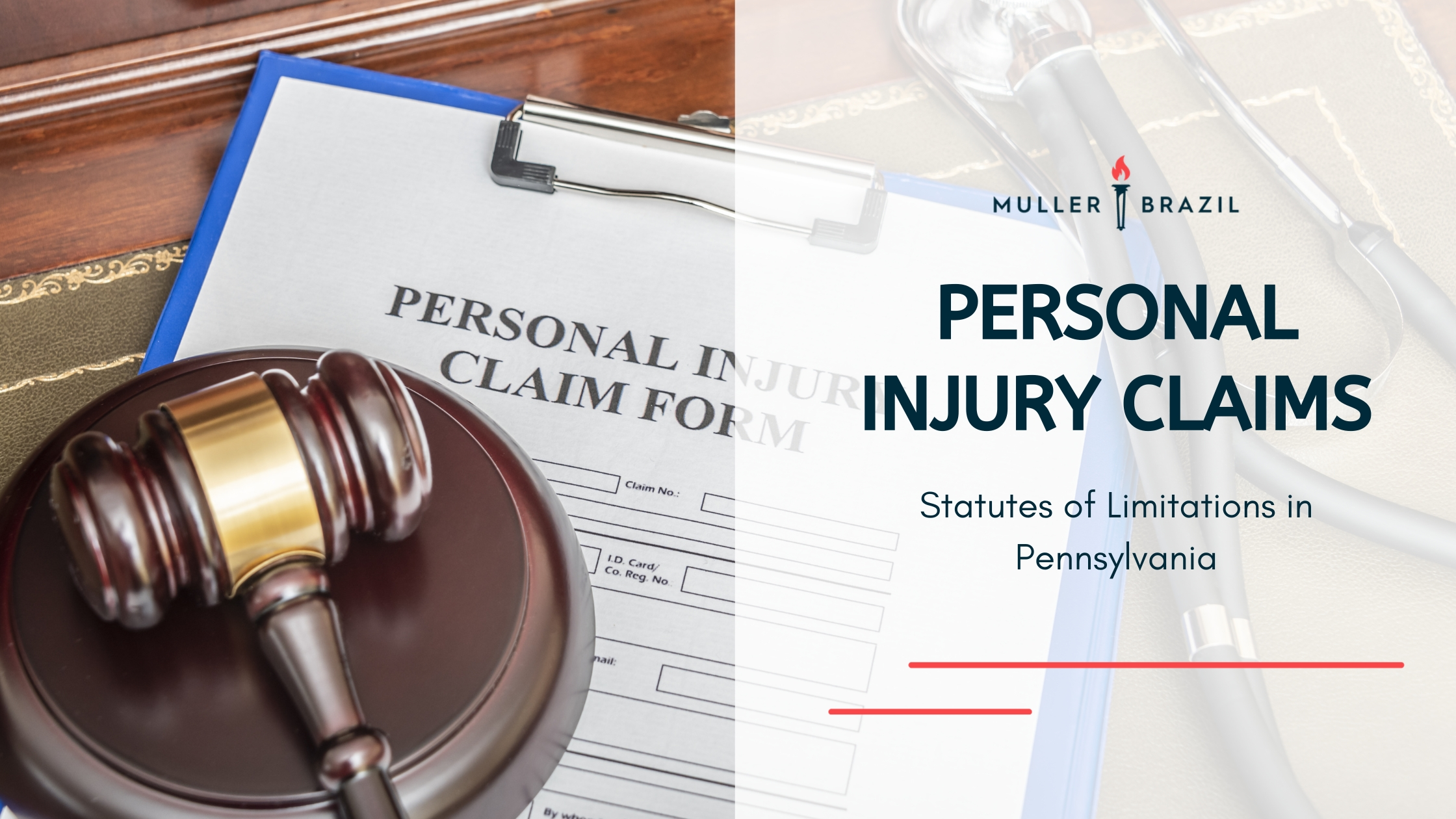8 min read
PA Personal Injury Claims: Statutes of Limitations
![]() Maximillian J. Muller, Esquire
Oct 27, 2023 12:02:52 PM
Maximillian J. Muller, Esquire
Oct 27, 2023 12:02:52 PM
Each year, thousands of people in Pennsylvania miss out on compensation because of the state’s strict two-year deadline for personal injury claims.
When an injury results from someone else’s negligence, Pennsylvania law offers a route to seek justice and fair compensation, but time is limited. Understanding the statute of limitations is challenging, yet with the right knowledge, injured victims can take steps to pursue the compensation they deserve.
In this guide, we’ll break down Pennsylvania’s personal injury statute of limitations, the role of personal injury lawyers, and the exceptions that could affect your case.
Understanding Pennsylvania's Personal Injury Statute of Limitations
When it comes to personal injury cases in Pennsylvania, the clock is ticking from the moment an injury occurs. The two-year statute of limitations sets a strict deadline for filing a personal injury lawsuit, and missing this window can have serious consequences, including the loss of the right to pursue compensation. Filing within the specified time frame after injuries from car accidents, slips and falls, or medical malpractice is key to achieving a positive resolution.
The statute of limitations applies to formal lawsuits and plays an important role in settlement negotiations with insurance companies and responsible parties. Thus, grasping the time constraints and fallout of Pennsylvania's personal injury statute of limitations is vital for victims to act promptly and receive the full compensation they are entitled to.
Time Limits and Consequences
In Pennsylvania, the statute of limitations for personal injury cases requires victims to file a lawsuit within two years of the injury. This deadline doesn't only kickstart legal proceedings but also significantly factors into settlement negotiations with insurance companies or defendants outside the court. Failing to meet this deadline can lead to the dismissal of the case, forfeiture of potential damages, and the loss of the opportunity to seek recompense for medical bills, lost wages, and other damages.
Unfortunately, the consequences of missing the statute of limitations is severe. The court may dismiss the case, and the plaintiff may lose their right to pursue a legal claim, even in wrongful death cases. Consequently, the injured party could be left without recourse to recover compensation for their losses, even if the defendant was clearly at fault.
To avoid such a situation, victims should engage personal injury lawyers well ahead of the two-year deadline. An experienced attorney helps ensure that the statute of limitations is met, allowing the victim to focus on their physical recovery and financial stability.
Starting Date for the Statute of Limitations
The starting date for the statute of limitations is generally the date of the injury, which is when the injured victim first suffers harm. For example, if a person is injured in a car accident on January 1st, the two-year statute of limitations would commence on that date and expire on January 1st, two years later. This deadline applies to most personal injury claims, including car accidents, slip and fall injuries, and medical malpractice cases.
However, certain exceptions may apply depending on the circumstances of the case. For instance, the discovery rule extends the statute of limitations if the injured party is not immediately aware of the injury or its cause. In such cases, the clock starts ticking when the victim becomes aware or should have reasonably become aware of the injury and its cause.
Regardless of the details, victims must act quickly and seek advice from personal injury attorneys to ensure they meet the deadline set by the statute of limitations. Doing so maximizes their chances of successfully recovering compensation for their injuries and losses.
Exceptions to the Two-Year Pennsylvania Statute of Limitations
While the two-year statute of limitations is strictly enforced in most personal injury cases, certain exceptions may extend the deadline in Pennsylvania. These exceptions include the discovery rule, cases involving minors, and intentional concealment. Understanding these exceptions and their implications helps injured victims and their families protect their rights.
Victims should seek advice from personal injury attorneys to establish if these exceptions are relevant to their case. An experienced Pennsylvania personal injury lawyer provides guidance on the specific circumstances that may extend the statute of limitations, allowing the injured victim to pursue compensation even if the standard two-year deadline has passed.
The Discovery Rule
The two-year statute of limitations in Pennsylvania can be extended through the discovery rule. This exception has a major effect on personal injury cases. Under this rule, the clock does not start ticking until the victim becomes aware, or should have reasonably become aware, of the injury and its cause. The discovery rule is particularly relevant in cases where the injury was not immediately apparent or where the victim was unaware of the connection between the injury and another party's negligence.
To successfully invoke the discovery rule, the injured party must demonstrate that they exercised reasonable diligence in discovering the injury and its cause. Ultimately, the jury's role is to assess whether the plaintiff acted reasonably in pursuing their claim. This exception underscores the importance of consulting with personal injury lawyers familiar with Pennsylvania's statute of limitations, as they help victims navigate the discovery rule and other potential exceptions.
Cases Involving Minors
When personal injury cases involve minors, the statute of limitations in Pennsylvania operates differently. For minors, the clock does not start ticking until they reach the age of 18, unless they were emancipated at the time of the injury. This means that a minor has until their 20th birthday to file a personal injury claim, giving them more time to seek compensation for their injuries.
This exception highlights the unique considerations and complexities involved in personal injury cases involving minors, especially when the injury occurred. Like any personal injury case, the injured party and their family should seek advice from seasoned personal injury attorneys who will steer them through the process and safeguard their rights. To get started, consider scheduling a free consultation with a qualified attorney.
Intentional Concealment
Intentional concealment is another exception that may extend the statute of limitations in Pennsylvania personal injury cases. This occurs when a defendant deliberately withholds information relevant to a personal injury claim, causing the statute of limitations clock to be paused during the period of concealment.
To prove intentional concealment, the injured party must present substantial, accurate, and convincing evidence that the concealed matters were intentionally hidden. Proving intentional concealment is a challenging task, further emphasizing the importance of retaining a skilled personal injury lawyer to navigate the complexities of Pennsylvania's statute of limitations and its exceptions.
Filing Claims Against Government Entities in Pennsylvania
Filing personal injury claims against government entities in Pennsylvania presents additional challenges. Claims against government entities, such as state employees or agencies, have a shorter statute of limitations of just six months compared to the typical two-year deadline for non-government cases.
In addition to the shorter deadline, claimants must also submit a notice of intent to sue to the appropriate government entity within the six months. Failure to comply with these requirements may result in the dismissal of the case, leaving the claimant without recourse for recovering compensation for their injuries.
Given the distinct challenges and tight deadlines in filing claims against government entities, victims should engage personal injury attorneys with expertise in these cases. These legal professionals will guide claimants through the process and ensure they meet the requirements to pursue compensation from government entities.
Shared Fault and Comparative Negligence in Pennsylvania
In Pennsylvania, personal injury cases may involve shared fault, where both the plaintiff and the defendant are found to be partially responsible for the accident. The state operates under a modified comparative negligence rule, which can impact the compensation an injured victim recovers in Pennsylvania personal injury lawsuits.
Under this rule, the court assigns a percentage of fault to each party involved, reflecting their contribution to the incident. The awarded damages are then reduced by the percentage of fault assigned to the plaintiff. For example, if the plaintiff is found to be 20% at fault for the accident, their compensation will be reduced by 20%.
This system of shared fault and comparative negligence highlights the importance of presenting a strong case that demonstrates the defendant's liability. By working with an experienced personal injury lawyer, injured victims maximize their chances of recovering fair compensation for their injuries, even if they share some responsibility for the accident.
Is PA a no-fault state? Read more with our blog.
The Role of a Personal Injury Lawyer in Managing the Statute of Limitations
A personal injury lawyer is indispensable in handling the statute of limitations and facilitating the successful pursuit of compensation for victims. From filing the initial claim to gathering evidence and negotiating settlements, an experienced attorney guides the injured party through the entire process.
Considering the stringent deadlines and possible exceptions linked to Pennsylvania's statute of limitations, victims should seek legal advice immediately after an accident. A personal injury lawyer helps determine the applicable deadlines, identify any relevant exceptions, and ensures that all necessary documentation is filed in a timely manner.
A personal injury lawyer's responsibility is to help the injured party build a strong case by gathering evidence, interviewing witnesses, and negotiating with the insurance company or responsible parties in personal injury lawsuits. With the support of an experienced attorney, injured victims can focus on their recovery while pursuing the compensation they deserve.
Summary
Understanding and navigating Pennsylvania’s statute of limitations is necessary for anyone considering a Pennsylvania personal injury lawsuit. Strict deadlines, specific exceptions, and shared fault rules make it important to act promptly and with expert guidance. By consulting with a trusted Pennsylvania personal injury lawyer at Muller Brazil, you can make sure that all legal requirements are met, maximizing your chances of securing the compensation you deserve.
Don’t let complicated timelines stand in the way of justice. With support from a law firm like Muller Brazil, you’ll be empowered to understand your rights and pursue the full compensation you’re entitled to. Take control of your recovery, contact Muller Brazil today to protect your claim and start building a stronger future.
Key Legal Services from Muller Brazil
For those affected by car accidents, slip-and-fall injuries, or medical malpractice, Muller Brazil’s personal injury lawyers offer dedicated assistance to build a strong case and negotiate with insurance companies. Working with an experienced attorney can make a significant difference, especially in complex cases where deadlines or exceptions may impact a claim.
Services such as free consultations are available to discuss case specifics and clarify the next steps. During a consultation, a lawyer will review your case, discuss any relevant exceptions to the statute of limitations, and explain Pennsylvania’s modified comparative negligence law to ensure you have a clear path forward.
If your injury involves unique factors, such as government entities or shared fault, the experienced team at Muller Brazil can provide legal support in these specialized areas as well. Visit our pages on car accident claims or medical malpractice lawsuits to learn more about these specific legal services.
By partnering with Muller Brazil, you’re taking an important step to understand Pennsylvania’s legal requirements fully and build a strong, timely case.
Frequently Asked Questions
How long after an accident can you sue in Pennsylvania?
In Pennsylvania, the law stipulates that victims of car accidents must initiate lawsuits within two years of the accident. This deadline, set by the statute of limitations, serves a critical purpose. encourages victims to promptly file their claims when the evidence of the accident is still fresh and readily available. This timely action is crucial as it aids in accurately reconstructing events, ensuring that the truth prevails and justice is served.
What is the personal injury law in PA?
In Pennsylvania, you can recover compensation for a personal injury claim as long as the level of fault is not more than 50% of the total fault. An action to recover damages must be started within two years, and those damages can include medical bills, lost wages, pain and suffering, etc.
What is the limitation on a personal injury claim?
The statute of limitations for filing a personal injury claim typically ranges from two to four years, depending on the state. If you don't file a lawsuit by the time the statute of limitations runs out, you won't be able to sue and will be unable to recover compensation for your losses.
Can the statute of limitations be waived in Pennsylvania?
In Pennsylvania, the statute of limitations is a strong defense to claims made beyond the appropriate time; however, this defense must be raised to be effective and can therefore be waived.
What is the statute of limitations in Pennsylvania?
The statute of limitations for civil cases in Pennsylvania is two years, and criminal cases have a deadline of 2-12 years, depending on the offense. Serious crimes such as murder do not have a time limit to bring charges.
Meet the Author
Max Muller - Founding Partner
Maximillian J. Muller is a founding member of Muller Brazil and My Vaccine Lawyer. Mr. Muller is an experienced litigator in both Federal and State Courts in the areas of vaccine injury, unsafe drug and medical device injury, personal injury, mass torts, and bad faith. Mr. Muller prides himself on keeping Muller Brazil on the cutting edge of injury litigation and running a client-focused practice.
Learn more about Max Muller ⇒





